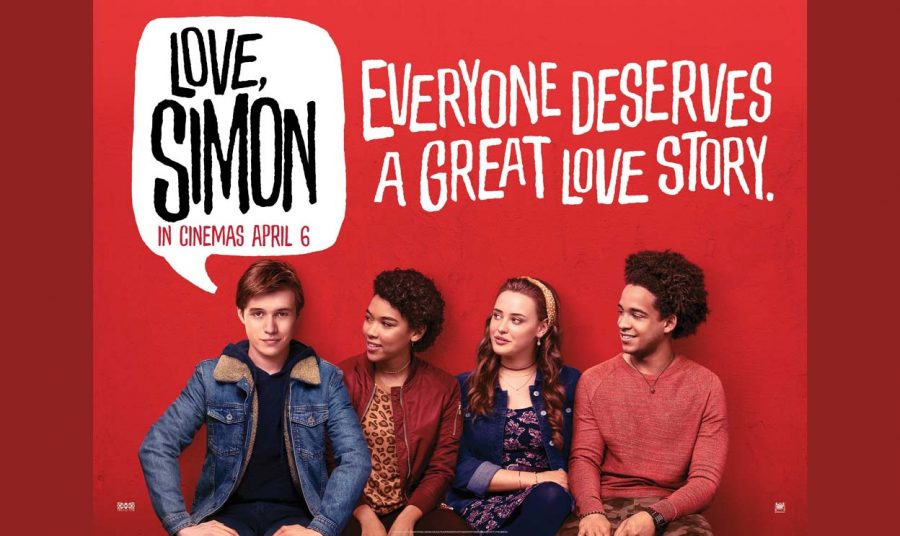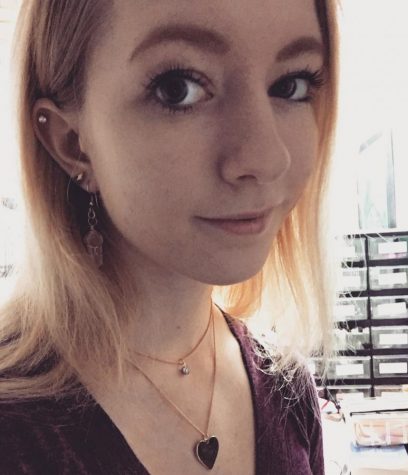‘Love, Simon’ Redefines LGBTQA+ Films
March 22, 2018
“My name’s Simon. I’m just like you…except I have one huge-a** secret: nobody knows I’m gay.”
This quote, the opening line from director Greg Berlanti’s romantic comedy film Love, Simon encapsulates the movie’s themes and tone better than anything I write about it ever could. Released on March 16, 2018, Love, Simon has set a historically significant precedent as the first full-length motion picture centering around the love story belonging to an LGBTQA+ teenager to be released by a major film studio (20th Century Fox, specifically). Although it can be argued that LGBTQA+ characters have technically appeared on the silver screen since its creation, their ratio to straight characters is alarmingly small, and in the occasions where they do appear, they are often reduced to mere stereotypes, fetishes, or jokes. Furthermore, even when shown in a positive light, it’s a very common trope for storytellers to “bury their gays”. Because of this, Love, Simon — which not only shows the gay protagonist realistically, respectfully, and compassionately, but also doesn’t allow the sad parts of his story to be the entire story — is a huge milestone for representation in cinema.
The film centers around Simon Spier, a closeted gay teenager attending a modern-day (although fictitious) high school in Atlanta, GA. The story follows him as his day-to-day life is abruptly changed by an anonymous forum confession posted by one of his classmates using the alias “Blue” stating that he is also closeted and feels trapped by his secret. They become pen pals via email without revealing their true identities and commiserate over their shared struggles with coming out. All is well until a boy named Martin, one of Simon’s peers, stumbles upon his incriminating correspondence with Blue. Using the unfortunate situation to his advantage, Martin threatens to show the emails to the entire school unless Simon sets him up with one of his best friends. The audience gets a window into Simon’s struggle as he is forced to choose between risking his reputation and his relationship with Blue or holding onto his integrity.
Berlanti has successfully done what many films of this kind have failed to do in the past, and that is bringing the lightheartedness we associate with rom-coms, specifically those marketed toward and documenting the experiences of high schoolers, into an unambiguously LGBTQA+ story — territory that such vivacious playfulness is often left out of. Simon’s story is equal parts endearing, sweet, relatable, funny, and heartfelt, and throughout the entire film, I couldn’t keep the smile from my face. Although told sometimes through hyperbole (including a delightfully colorful, Pride-inspired, music video style interlude as Simon considers what his future may look like should he leave the closet), this is done with such mastery that it seems to mirror the intense ups and downs that come with adolescence intentionally. This creates an effect throughout as though the movie was a tall tale one lovingly tells when looking back on their childhood.
What holds this movie up from its foundations is its technical aspects, beginning with natural, witty, and sympathetic dialogue carried further by pleasantly educated humor and subtle performances. Nick Robinson as Simon successfully portrays the emotional turmoil that comes with growing up in a world where one is the “other”; he maintains likeability and warmth through his chemistry with other actors so well that the audience feels his character’s sentiments exactly as they happen. Katherine Langford, Alexandra Shipp, and Jorge Lendeborg serve as foils to Simon (playing his group of closest friends) and amplify the pressure he feels from his community as well as the many social barriers he feels between himself and the trust and acceptance he knows waits behind them. These performances are complemented by Logan Miller as Martin, as he skillfully transforms what could have been a cliche, heartless bully archetype into someone that all of us could know and potentially get along with, even given the harmful choices his character makes. The love and attention these actors put into their roles are further supplemented by the editing, with many scenes filmed as brief looks into the characters’ inner thoughts, displaying the ways that all of us imagine conversations and future situations before they happen in great and often ridiculous detail.
Ultimately, Love, Simon is a narrative about love, friendships, growth, and forgiveness, and a large part of its success relies on the fact that the writers, director, and performers have treated the characters and the world they live in with dignity. Every part is given respect to the point where even minor characters have been elevated above stereotypes — from the teachers, to the characters’ families, and even to the primary bully antagonist. Their complexities and individuality are explored and tropes warped beyond their original capacity, allowing for a much needed dose of realness to a genre often over-simplified. Although critiques have been made citing that the LGBTQA+ community contains multitudes more faces than just the white, gay men often portrayed and that another work chronicling the same story is no longer necessary, I would argue that Love, Simon contains uniqueness and diversity beyond the title character. Through those attending school with him, it manages to simultaneously celebrate and not discredit flamboyance while still displaying abundantly that LGBTQA+ kids really are just like you.



